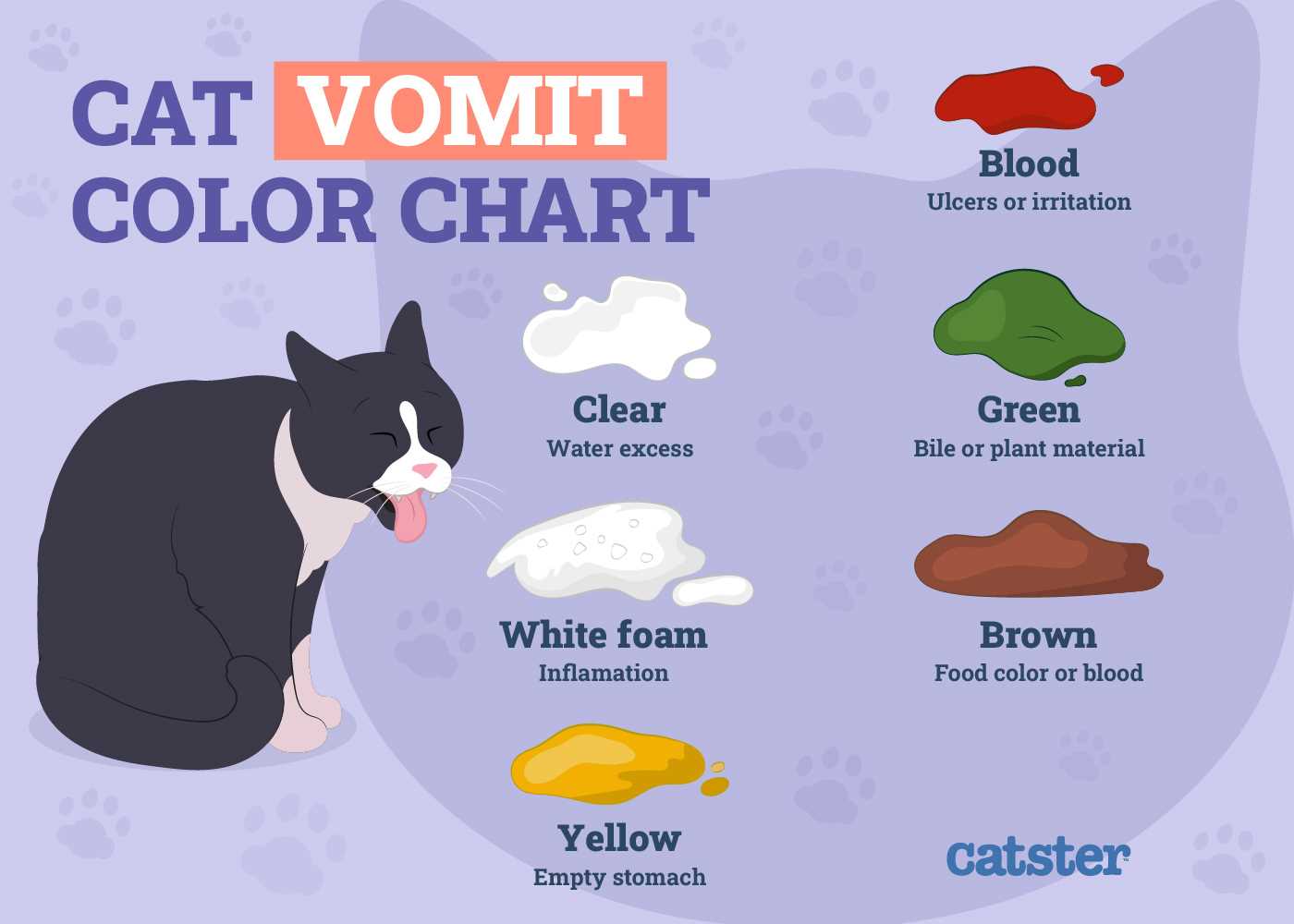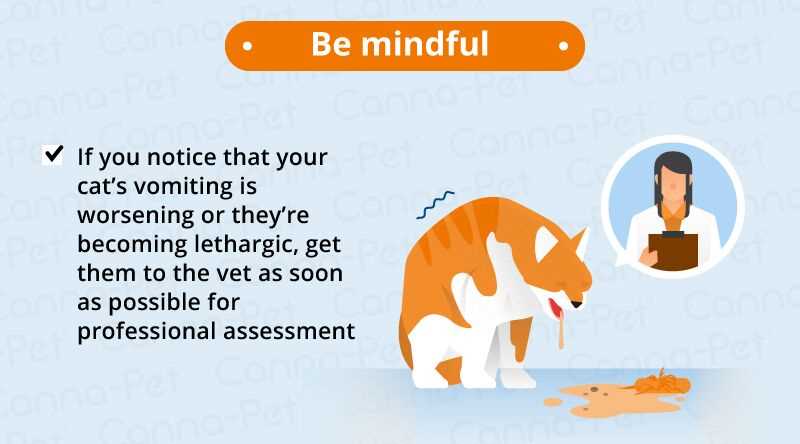When I feel a bit queasy, the first thing to try is withholding food for 12-24 hours. This break allows my tummy to settle down and reduces irritation. Water is still important, so I keep my bowl filled with fresh, clean water during this time.
After the fasting period, I slowly reintroduce food with small amounts of bland, easily digestible options. Plain cooked chicken or rice works wonders for me. It’s crucial to monitor how I respond to these gentle meals. If I seem better, I can gradually return to my regular diet.
Staying hydrated is key! If I don’t drink enough, I can become dehydrated. Offering ice cubes or broth can encourage me to sip more. If the situation doesn’t improve or if I show signs of distress, it’s time for my human to seek help from a vet. My comfort and well-being always come first!
Identifying the Cause of Your Feline’s Upset Stomach
Check the diet first. Have there been any recent changes in food? New flavors or brands can upset sensitive tummies. Monitor how much is consumed and if any unusual items were sneaked in.
Observe for additional signs. Is there lethargy, diarrhea, or changes in behavior? These can indicate something more serious than an upset stomach. Pay attention to the frequency of the regurgitation, as this can help pinpoint the issue.
Consider stress factors. Have there been any changes in the environment like new pets, moving, or loud noises? Stress can trigger digestive issues. Create a calm space for relaxation and monitor its effect.
Examine for possible foreign objects. Cats are curious creatures and often ingest non-food items. If you suspect this, a visit to the vet is necessary for a thorough examination.
Assess for other health issues. Conditions such as infections, allergies, or underlying diseases can manifest through digestive disturbances. If symptoms persist, consulting a veterinarian is advisable.
Record everything. Keeping a detailed log of feeding times, types of food, and any behavioral changes can aid in identifying patterns and causes. This information is valuable during a vet visit.
When to Consult a Veterinarian for Vomiting
If I experience repeated episodes of regurgitation, it’s crucial to seek professional help. This applies if I throw up more than two times within 24 hours. Frequent occurrences can indicate an underlying issue that needs immediate attention.
Signs of distress such as lethargy, refusal to eat, or any noticeable changes in behavior should not be ignored. If I seem more tired than usual or hide away, it’s time to visit the vet.
Any presence of blood in the expelled matter, whether it’s bright red or dark, signals a serious problem. This warrants an urgent consultation with a healthcare provider.
Additionally, if I show signs of dehydration–like dry gums or excessive thirst–it’s important for my human to take me to the vet right away. This can happen quickly and needs to be addressed immediately.
In cases where my tummy seems bloated or painful, or if I struggle to keep anything down, that’s another red flag. A vet visit is necessary to diagnose the root cause.
Lastly, if there’s a recent change in my diet or I’ve ingested something unusual, don’t hesitate to reach out for professional guidance. It’s always better to be safe than sorry when it comes to my health.
Home Remedies for Mild Feline Upset

Ginger can be a helpful ally when feeling unwell. A small piece of fresh ginger root, grated and mixed with warm water, can soothe the stomach. Allow it to steep for a few minutes, then offer a few teaspoons to your furry companion.
Hydration is Key
Ensuring adequate water intake is crucial. If your friend is reluctant to drink, try offering ice cubes or frozen broth in a bowl. This can encourage sipping while providing hydration. Always have fresh water available.
Dietary Adjustments
Switching to a bland diet for a few days may help. Consider offering plain boiled chicken or rice. Gradually reintroduce regular food once the tummy seems settled. Monitor for any adverse reactions during this transition.
Dietary Adjustments to Prevent Future Vomiting

Switching to a high-quality, easily digestible diet is crucial for keeping my tummy happy. I prefer meals rich in protein and low in fillers. Look for foods that list meat as the first ingredient, avoiding those with too many grains.
Gradual Transition
Making changes to my food should be done slowly. Mix the new food with the old over a week to avoid upsetting my stomach. Start with a ratio of 75% old food to 25% new, then gradually shift.
Portion Control
Feeding smaller, more frequent meals helps prevent me from overeating. Instead of one big bowl, I enjoy a few smaller servings throughout the day. It keeps my energy up and my digestive system on track.
- Monitor my weight regularly to adjust portion sizes accordingly.
- Consider using a feeding schedule to establish routine.
Avoid sudden changes in my diet. If I have a sensitive stomach, consult with a vet about suitable options. Lastly, keep my water bowl full at all times to stay hydrated, especially if I’m on a dry food diet.
For families with pets, I’ve heard that choosing the best dogs for kids and cats can create a harmonious environment and reduce stress, which is also beneficial for my digestion!
Monitoring Your Feline’s Recovery After Upset Stomach
After experiencing an upset stomach, it’s vital to closely observe my behavior and overall health. Pay attention to the frequency of any additional regurgitation. If I only had one episode and appear normal afterward, that’s a good sign. However, if I continue to show signs of distress, it may indicate an underlying issue.
Track my eating habits; if I refuse food for more than 24 hours, it’s time to take action. Ensure I stay hydrated by monitoring my water intake. Dehydration can occur quickly, so keep my water bowl filled and fresh.
Watch for any changes in my energy levels. If I seem lethargic or withdrawn, it’s crucial to take note. A playful and active demeanor is a good indicator that I’m on the mend. Keep an eye on my litter box, too; any abnormalities in my bathroom habits could suggest ongoing problems.
In case of persistent issues, consider logging my symptoms and behavior. This information can be useful for a vet visit if needed. For those curious about cleaning tools, check out this link: can you put a carbon scrubber on a plane exhaust.
Remember, being attentive and proactive will help ensure I recover smoothly. If you have any doubts, seeking professional advice is always wise. Let’s keep me healthy and happy!
FAQ:
What are the common causes of cat vomiting at home?
Cat vomiting can be triggered by various factors. Some of the most common causes include dietary indiscretion, such as eating too quickly or consuming spoiled food. Hairballs are another frequent issue, especially in long-haired breeds that groom themselves often. Additionally, gastrointestinal disorders, food allergies, or sensitivities may lead to vomiting. In some cases, underlying health problems like infections or organ dysfunction might be the cause. If vomiting persists, it’s crucial to consult a veterinarian for a proper diagnosis.
How can I help my cat if it vomits occasionally?
If your cat vomits occasionally, there are several steps you can take at home. First, monitor your cat’s behavior and overall health. Ensure they are still eating, drinking, and behaving normally. You might want to withhold food for 12 to 24 hours to give their stomach a chance to settle. After the fasting period, reintroduce food slowly, starting with bland options like boiled chicken or rice. Keeping your cat hydrated is also important, so provide fresh water. If vomiting continues or is accompanied by other symptoms like lethargy or diarrhea, seek veterinary advice.
Are there any home remedies for cat vomiting?
There are a few home remedies that might help a cat that is vomiting. One common approach is to offer small amounts of plain, unsweetened pumpkin puree, as it can help with digestion. Additionally, introducing a bland diet, such as boiled chicken without skin or plain rice, may soothe your cat’s stomach. Always ensure your cat has access to fresh water to prevent dehydration. However, these remedies should be used with caution, and it’s advisable to consult a veterinarian if the vomiting persists or worsens.
When should I take my cat to the vet for vomiting?
It’s important to seek veterinary care if your cat vomits frequently or shows other concerning symptoms. You should take them to the vet if you notice signs of dehydration, such as dry gums or lethargy. If the vomit contains blood or has a strange color or consistency, it is also a warning sign. Additionally, if your cat is unable to keep food or water down after 24 hours, it’s best to consult a veterinarian. Early intervention can be crucial in addressing underlying health issues.






